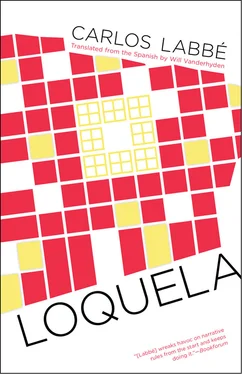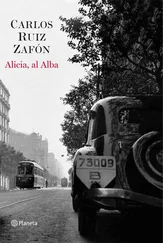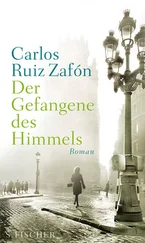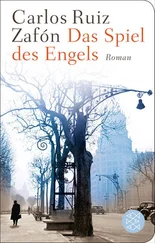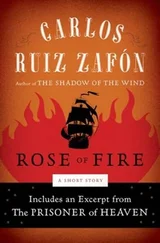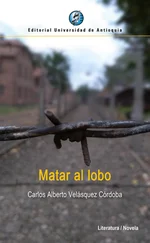Then I woke up and went to the bathroom. Then to the kitchen, still half asleep, and I realized that someone had slipped a letter under the door, a letter that got the recipient’s address wrong. The sender’s name is “Violeta Drago.” Do I know her? Of course I know her. She’s the friend Alicia has been crying over, locked away in her room all these days. The friend who was apparently murdered in her own apartment, a horrible crime that was never publicized. Just now, I remembered a time when Alicia showed me a video from her graduation, she paused the video to point out her friend Violeta, the albino girl.

August 12 th
12:13
I write little because I’m beginning to value silence. During break Alicia and I discussed the uselessness of writing just a character’s initials, it no longer drew attention to the connotations of the names, the characters lost immediacy and simply became letters (she’s reading Kafka). I’m tortured by hundreds of images and ideas, I can’t maintain coherence in my diary. So much to say, but also so much noise: cars, footsteps in the hallway, the telephone. .
It was Alicia calling. Why does her ability to silently absorb the problems of others attract me this way? Why does being next to her physically paralyze me? Why, over the phone, were we functional (functional? we’re not machines)? I’m sad and alone in the middle of a sad city. Alicia seems better prepared than I for the constant aggression of Santiago’s inhabitants; she seems to always be going somewhere. (Once, awkwardly, I asked her — she was on the verge of tears and I didn’t know if I should say something, which is what her friend who died would’ve done — what she did for fun, and she said, “I never wanted to be here, that’s why I leave sometimes.”) Alicia, never serious, told me during break that if I wrote a diary or something like that, I should name her A and not Alicia, because readers would invariably associate her with that little girl who went to Wonderland, a situation that was not at all accurate in her case. I am sad, a delicious wind is blowing, the myrrh trees are already in bloom.
Yesterday afternoon T confessed to me that he was starting to scare himself. Every year, at the beginning of spring, he experienced a sensation of overwhelming emotional catastrophe. “Like the driver of a car who discovers that he’s dead a second before crashing,” he said, hearing the birds start to sing, the blue sky, the warmth returning. Then he confessed to me: couples will start making out right in front of my eyes, walking around holding each other, happy, and I’ll be alone. Winter coats and summer orgies won’t do; spring speaks the truth: some come to this world alone and others come in groups. (T asks for advice, I maintain my position and invent experiences to support my words. Then I hate myself: but I can’t stop lying. I’m not sure anyone would be interested in what I’d have to say if I could.)
(According to Blanchot, Sade says the only way to avoid suffering is to enjoy the giving and receiving of pain. But, at the same time, the only way to transcend the vice of sadism is to become unfeeling, because vice makes me weak again, rendering me dependent on pleasure and pain.) If only for a little while I might stop feeling. (Although I think that is impossible in this harsh, biting world. In the city of Santiago, pausing in the middle of the street, when the face of a girl demands your attention, bears as consequence a car blasting you with its horn, a woman gesturing “get moving, jackass,” a delinquent selling ice cream stepping on your feet in the rush to board the micro . And by then the face would already be lost in the swarming crosswalk at Lyon and Providencia.) To write is to feel myself dangerous in the moment I do not hesitate. But I must accept that in a diary I’m allowed to be obscene. (I think about J, her small face between my hands, “it hurts,” “you make me feel like a slut,” then I kiss her forcefully. Awful night, her really awful bed, the worst part is that it was I who was there. And afterward I fled, what a coward. J, forgive me. Yes, I do feel bad.)
Alicia loaned me a magazine from Uruguay. I’m staring at a photograph of Pizarnik, the article says that she realized with horror that writing was keeping her alive, and the result of this was her spine-tingling poems. In her face you can see how greatly she needed the silence. “A great writer of letters,” says the caption. What is this lush mystery in the correspondence of strangers? Why is it that I’d kill to gain access to the stack of letters that Alicia says is her prize possession? (I want to be honest, I aspire to that in these pages: I’ve been waiting several months for two letters: the one Alicia sent me from Czechoslovakia last summer, marvelously trivial, without a doubt, but something of her, for me, indelible smile would arrive in that envelope; the letter that J implied she was going to send me, if I’m not mistaken, telling me off over and over, after describing in cruel detail what happened that February night when I was a monster. The postal service took care of losing them, and I’ve not heard from J since. And what if Alicia finally did decide to write me, is it possible that I’ll never get to possess her handwriting?)
And yet, the letter from Alicia’s friend is still in the drawer. It’s taken an effort not to open it, I should give it to Alicia tomorrow, it’s addressed to her. (Every time Alicia sat down next to me in the quad, she seemed to be searching for a word. I talk and I talk. She remains distant. Is it possible that Alicia was born while her parents were traveling abroad somewhere? No, that was her friend, the one who died, the one who spent her life thinking of a way to escape, “to go back,” as Alicia says. Back where? And I chose to hide myself in this dusty apartment instead of wandering through the deserted fields of Rancagua.) They say that Alicia writes too, poems maybe. Pizarnik’s eyes. Pizarnik’s mouth. The professor at the university, with the uncomprehending smile: “Poetry is the woman: an image that contains and expresses itself through suggestion, with silences; narrative is like men: another image, but this time expansive, overwhelmingly explicit and verbose.” But Alicia looks so sure of herself, she gives me a sidelong glance and tells me about things that happened in her childhood. When she names them, the ten people she’s been involved with in her life, they revolve around me, as if I knew them.

August 12 th
7:50 P.M.
I don’t want to sit and write, I’m exhausted, but if I stop I’ll forget myself. I took an hour-long nap, an hour and a half, give or take, and I dreamed. This last week the nightmares have been constant, the face of the albino girl (Violeta?) cupped in the hands of some man. The man caresses her, she maintains a stoical expression of sensual pleasure, a face of false enjoyment. The man was me, I mean, it wasn’t me but the resemblance was horrifying. It was Carlos. The phone woke me, a telemarketer or something; I realized that it’d been years since I’d last written about Carlos and his girlfriend. At that time, J lived only a few blocks away, we’d wait for each other in the square, for the other to appear when one of us was sad and needed a shoulder to cry on. (And this longing, what is it?) I would give her little sheets of paper with poems written on them. Wow.
Pathetic Carlos. I found the notebook containing the story I wrote the summer of my and J’s first kiss. “Carlos is actually just the opposite of me, I’m a coward. He’s fearless, he acts,” that’s how the opening paragraph starts. I took out Violeta’s letter before lying down to go to bed. I stared at it. What would Carlos do in this situation? Open the envelope and read what it says.
Читать дальше
